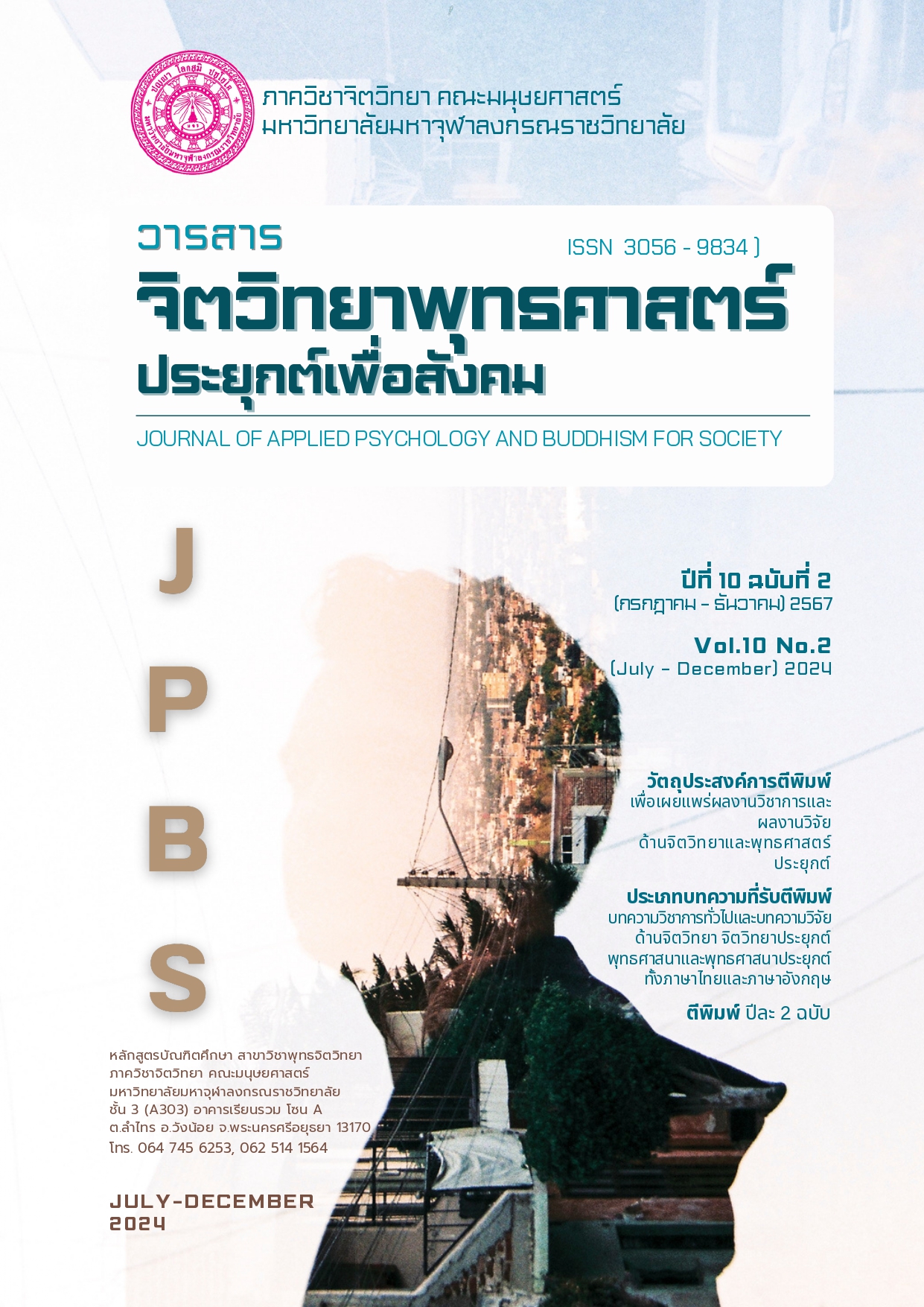Psychological Experience of Buddhist Counselors when Encountered with Clients of Conflicting Value
คำสำคัญ:
Buddhist Counseling, Counseling, Conflicting Value, Three Marks of Existence, Four Noble Truths, counselor-in-trainingบทคัดย่อ
This study employs qualitative research. The aim of this study is to explore the psychological experience of Buddhist counselors when encountered with conflicting value. The objective of this research is to understand the psychological experience of Buddhist counselors when dealing with conflicting value through conducting semi-structured interviews using Interpretative Phenomenological Analysis (IPA) research style as a tool for qualitative research to capture the details and experience of six experienced Buddhist counselors. Data collected were transcribed, coded and arranged into themes, which got translated from Thai to English. The six informants were chosen in relation to their experience in using core approach of Buddhist counseling along with prior experience in dealing with conflicting value. The recruitment employed purposive sampling through a gatekeeper that qualifies the inclusion criteria. The research instruments are semi-structured interview questions that have been crafted to highlight the informants’ answer on their experiences in conflicting value.
The result of this study shows three stages: Initial, Process, and Integration. Initial stage is the reaction and response of informants when first encountering with conflicting value and consists of three themes (Interaction with conflicting value, effects to performance, and consequence) with seven subthemes. Process stage illustrates the awareness and development of informants in accordance with conflicting value, which consist of five themes (Initial awareness, internal process, Post-awareness, Post: effects to performance, and Post: consequence) with eleven subthemes. Lastly, integration stage portrays the learnings and knowledge as informants gain experience in dealing with conflicting value, which consists of personal implication as theme with four subthemes. Informants who undergo the process of encountering and overcoming conflicting value expressed deep learning in Buddhist counseling and Buddhist teachings along with various understanding of self and attachments.
The result of going through conflicting value enhances self-awareness in working process of Buddhist counseling and further develop deeper understandings in Buddhist teachings that increases the ability of informants to perceive attachments to self and move towards the practice of impermanence, suffering, and non-self in Three marks of existence along with four noble truths through this experience.
เอกสารอ้างอิง
American Counseling Association. (2005). ACA code of ethics. Alexandria, VA: Author.
Chu, I., & Vu, M. C. (2021). The Nature of the Self, Self-regulation and Moral Action: Implications from the Confucian Relational Self and Buddhist Non-self. Journal of Business Ethics, 180(1), 245–262.
Cottone, R. R., Tarvydas, V. M., & Hartley, M. T. (2021). Ethics and decision making in counseling and psychotherapy. Springer Publishing Company.
Coseru, C. (2020). Reasons and conscious persons. Retrieved November 20, 2024, from https://doi.org/10.4324/9780429488450-11
Dalai Lama (1995). The Path to Enlightenment. Ithaca, NY: Snow Lion.
De Silva, P. (2000). An introduction to Buddhist psychology (3rd ed.). Lanham, MD: Rowman & Littlefield.
Kocet, M. M., & Herlihy, B. J. (2014). Addressing value-based conflicts within the counseling relationship: A decision-making model. Journal of Counseling &; Development, 92(2), 180–186.
Pokaeo, S. (2010). The synthesis of the four noble truth in Buddhism and integration of psychotherapy for mental well-being: ideology, process, experience, and research. Bangkok, Chula University.
Smith, J., Flowers, P., & Larkin, M. (2009). Interpretative Phenomenological Analysis: theory, method, and research. London, UK: Sage.
Rønnestad, M. H., & Skovholt, T. M. (2003). The Journey of the Counselor And Therapist: Research Findings and perspectives on Professional development. Journal of Career Development, 30(1), 5–44.
Van Gordon, W., Shonin, E., & Griffiths, M. D. (2017). Buddhist emptiness theory: Implications for psychology. Psychology of Religion and Spirituality, 9(4), 309–318.
ดาวน์โหลด
เผยแพร่แล้ว
รูปแบบการอ้างอิง
ฉบับ
ประเภทบทความ
หมวดหมู่
สัญญาอนุญาต
ลิขสิทธิ์ (c) 2024 วารสารจิตวิทยาพุทธศาสตร์ประยุกต์เพื่อสังคม

อนุญาตภายใต้เงื่อนไข Creative Commons Attribution-NonCommercial-NoDerivatives 4.0 International License.






